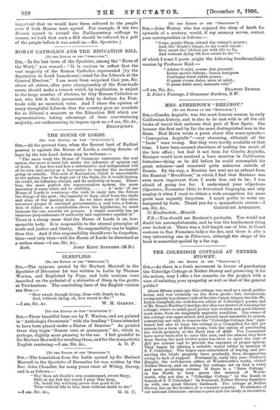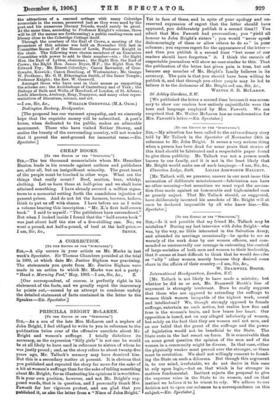THE COLERIDGE COTTAGE AT NETHER STOWEY.
[To THE EDITOR OF THE " SPECTATOR." J
SIR,—As there is a fresh movement in favour of purchasing the Coleridge Cottage at Nether Stowey and preserving it for the nation, may I offer a few remarks on the project with a view of enlisting your sympathy as well as that of the general
public ?
About fifteen years ago this cottage was used as a small public- house, and was certainly on the down grade; but, fortunately, owing mainly to a chance visit of the late Canon Ainger, the late Mr. Dykes Campbell, the well-known editor of Coleridge's poems, and of Mr. Ernest Hartley Coleridge, the idea was started of rescuing the cottage, where so much good poetry was written and good literary work done, from its singularly unpoetic condition. The owner of the cottage was approached, and proved most amenable to reason, consenting not only to remove the "Coleridge Cottage Inn" sign- board, but also to lease the cottage to a Committee for £15 per annum for a term of fifteen years, with-the option of purchasinc, the whole property at the fixed sum of £600. The Committee have never been able to raise this sum and the utmost they have done during the past twelve years has been to meet the rent of £15 per annum and to provide the expenses of proper upkeep. They began by affixing a suitable mural tablet in memory of S. T. Coleridge. The hopes once entertained of buying and pre- serving the whole property have gradually been.disappearing, owing to lack of support. Fortunately, early this year Professor Knight, the well-known editor of Wordsworth's works, visited Nether Stowey, and on seeing the cottage, set on foot a wider and more promising scheme. If there is a "Dove Cottage" in the North to keep green the memory of Words- worth, why not also a "Coleridge Cottage" in the South in honour of S. T. Coleridge? In Somerset, Nether Stowey furnishes us with one great literary landmark. The cottage at Nether Stowey lies on the borders of a romantic country. To students of our national literature teeking a quiet spot for study or recreation,
the attractions of a rescued cottage with many Coleridge memorials in the rooms, preserved just as they were used by the poet and his numerous literary friends, would surely be great. At the same time, according to Professor Knight's scheme, there will be (if the means are forthcoming) a public reading-room and library close to the Coleridge Cottage itself.
Through the courtesy of the Earl of Crewe, a meeting of the promoters of this scheme was held on November 15th last in Committee Room C of the House of Lords, Professor Knight in the ahaia. The following were chosen members of an Executive Committee with power to add to their number—viz. : the Right Hon. the Earl of Lytton, chairman ; the Right Hon. the Earl of Crewe ; the Right Hon. James Bryce, M.P.; the Right Hon. Sir Edward Fry; Mr. Ernest Coleridge; Canon Rawnsley, of Cros- thwaite, Keswick ; Canon Beeching, of Westminster; Mr. George W. Prothero ; Mr. G. H. Etherington Smith, of the Inner Temple; Professor Knight; the Rey. W. Greswell. Amongst those who have sent in their names as supporting the scheme are: the Archbishops of Canterbury and of York ; the Bishops of Bath and Wells, of Hereford, of London, of St. Albans; Lords Aberdeen, Avebury, Reap, Tennyson, and many other repre- sentatives of literature, science, and art.
—I am, Sir, &c., WILLIAM GRESWELL (M.A. Oxon.)
Dodington Rectory, Bridgwater.
[The proposal has our warmest sympathy, and we sincerely hope that the requisite money will be subscribed. A poet's house, when dedicated to the public, makes an admirable monument. Those who have visited Nether Stowey, and realise the beauty of the surrounding country, will not wonder that it proved the seed-ground for immortal verse.—En. Spectator.]



























































 Previous page
Previous page